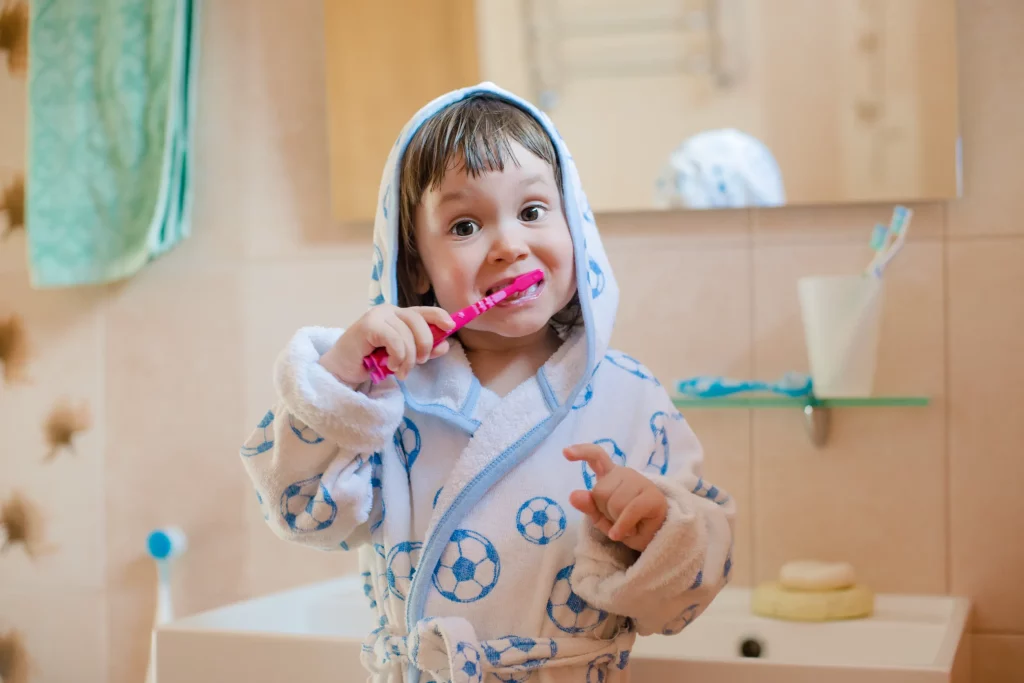The number-one problem threatening children's oral hygiene in Switzerland is tooth decay. Although dentists from Fribourg to Lausanne are seeing an improvement, the risks are still there. In fact, it's not uncommon for cavities to form on the milk teeth of very young children. By the age of 5, around one child in two has at least one cavity. This applies to both primary and permanent teeth, the appearance of dental caries can lead to pathologies in the future.
Teaching good dental habits
The best way to protect your child's teeth is to learn the essential gestures for a healthy smile. good oral hygiene. From an early age, your little boy or girl will adopt a daily routine to maintain optimal oral health.
Obviously, children don't have the ability to concentrate and brush their teeth on their own. It's essential that an adult supervises these gestures and provides help and advice. You can explain the role of bacteria and why plaque needs to be removed in a fun and educational way. Don't hesitate to inspect your little one's mouth for any black or white spots that may indicate potential cavities.
Brushing your teeth
At what age should children start brushing their teeth? This is a question asked by many parents at dental practices in Fribourg and Lausanne. The answer from Swiss Society of Dentists SSO is simple: as soon as the first tooth emerges. We recommend buying a soft-bristled children's toothbrush and brushing twice a day. Manufacturers offer different models to suit all needs and ages. Don't hesitate to ask your pediatrician or dentist for advice.
Children's toothpaste
Use fluoride toothpaste specially designed for children. The dosage and composition are adapted to the needs of little ones. Fluoride is essential in the fight against tartar build-up and tooth decay. Here are a few tips to give you an idea of how much toothpaste you'll need:
- Before age 3: the size of a grain of rice
- From age 3: the size of a pea
If your child doesn't like the taste of one toothpaste, we recommend you try another. The important thing is to find one that your child likes, so that brushing his or her teeth is a pleasant experience. That said, bear in mind that your child must not swallow the toothpaste. So you'll need to teach him to rinse his mouth and spit into the sink.
Brushing technique
Children's oral hygiene also involves learning how to brush. Some will tell you to brush from top to bottom, others from left to right, or even in a circular motion. Whatever the case, the most important thing is to brush every tooth and every surface thoroughly. You can set up a sort of game to encourage your child to clean all his teeth. For example, tell them to find the hidden tooth. Be aware, however, that children are not able to brush their teeth without the help of an adult before the age of 6 or 8.
Sugar consumption
Another fundamental measure for children's oral hygiene concerns diet. The food and drinks your little one consumes play a vital role in his or her oral health. The same applies to adults. It's no secret that sugar is the number 1 enemy of healthy teeth. The more teeth are exposed to sugary products, the greater the risk of tooth decay. Avoid sweet, sticky foods that stay in the mouth for a long time, such as candy, dried fruit, caramel and chewing gum. As an alternative, opt for sugar-free sweets bearing the Swiss Sympadent label.
Inspection visits at the dentist
A final tip for keeping children's oral hygiene in check: make regular visits to the dentist. The practitioner will meticulously inspect your child's oral cavity. Teeth, gums, inside cheeks, tongue - he'll make sure everything's in order. In the event of tooth decay, he will suggest a suitable treatment. A check-up every 6 months gives you peace of mind. Your dentist will also make sure your teeth are developing properly, and share more personalized advice on how to adopt better oral hygiene.
HELVIDENT welcomes adults and children to its three dental clinics in Fribourg, Lausanne and Aigle. Our team includes all specialists under one roof. Don't hesitate to Contact us to schedule a dental consultation for your child.

